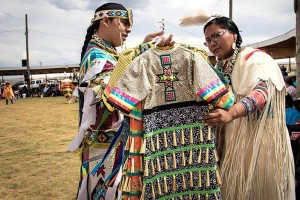 Chattanooga, August 11 - A man who campaigns for the recognition of indigenous status for the descendants of the tribes who inhabited the Americas before Europeans colonized the land acknowledged today his ambivalence about his efforts, because those efforts conflict with two key axioms of his worldview, namely that Palestinians were there first and that their claims take priority among all progressive causes.
Chattanooga, August 11 - A man who campaigns for the recognition of indigenous status for the descendants of the tribes who inhabited the Americas before Europeans colonized the land acknowledged today his ambivalence about his efforts, because those efforts conflict with two key axioms of his worldview, namely that Palestinians were there first and that their claims take priority among all progressive causes.
Michael Hayes, 23, shared his internal conflict with a group of fellow activists during a drive from the Washington, DC, area to a retreat just outside Memphis where like-minded campaigners for human rights will share experiences, ideas, and reflections on their work. "There's this tension I've been sensing for some time," he confessed to his two car-mates at a rest stop. "I get that solidarity with other rights gives smaller groups the ability to generate greater impact and make more noise. The thing is, the only pattern I know is for other causes to cede primacy to the Palestinian cause, and I'm struggling with how to do that effectively in my work."
"Let's take Indian reservations," he explained. "Anyone can see the neglect, even outright hostility, that animates official policy on reservations. But I'm having trouble determining where the transition is supposed to begin from combating that systemic abuse and dispossession, with all the associated traumas and side-effects, to using the phenomenon merely as a prop to illustrate what Palestinians face. Like, are we actually supposed to care about indigenous Americans, or does the importance of their suffering and their status as victims of injustice exist only while it can serve as leverage for the true cause, Palestine? I need clarity."
His buddies offered encouragement. "You'll get to an equilibrium," predicted Mason Fletcher, whose activism against over-policing in minority communities has overlapped with anti-Israel campaigns alleging Israeli complicity in the phenomenon. "I know my focus area isn't the same as yours, but we're all fighting an oppressive system from different directions and each of us has to decide for themselves what weight to give Palestine in that constellation of considerations. A lot of it depends on funding, to be honest."
"Ain't that the truth," spat Haida Batar, a women's rights campaigner whom both Fletcher and Hayes have tried to impress with their feminist credentials, so far without success. "Goddamn Zionists and all their money. We wouldn't need money like this if the patriarchy weren't so entrenched. That's exactly why we have to liberate Palestine. Everything flows from that. I don't know how, exactly, but social justice language has always featured prominently in anti-Jewish stuff, which must mean we're on the right track."
|
Or order from your favorite bookseller, using ISBN 9798985708424. Read all about it here! |

|

 Elder of Ziyon
Elder of Ziyon


















.jpg)




